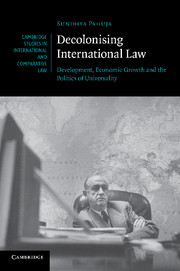Book contents
- Frontmatter
- Contents
- Acknowledgements
- 1 Introduction
- 2 Inaugurating a new rationality
- 3 From decolonisation to developmental nation state
- 4 From permanent sovereignty to investor protection
- 5 Development and the rule of (international) law
- 6 Conclusion
- Appendix One A note on the use of ‘Third World’
- Appendix Two Harry Truman – Inaugural Address
- Bibliography
- Index
- cambridge studies in international and comparative law
Appendix One - A note on the use of ‘Third World’
Published online by Cambridge University Press: 07 October 2011
- Frontmatter
- Contents
- Acknowledgements
- 1 Introduction
- 2 Inaugurating a new rationality
- 3 From decolonisation to developmental nation state
- 4 From permanent sovereignty to investor protection
- 5 Development and the rule of (international) law
- 6 Conclusion
- Appendix One A note on the use of ‘Third World’
- Appendix Two Harry Truman – Inaugural Address
- Bibliography
- Index
- cambridge studies in international and comparative law
Summary
It should be clear enough why I am refusing ‘developing’ and ‘developed’ as a way to refer to those familiar, but rough and difficult to name, categories of nation states. It is perhaps not so obvious why I mostly eschew other delimitations such as ‘rich’ and ‘poor’, ‘North’ and ‘South’, or ‘industrialised’ and ‘non-industrialised’, in favour of ‘Third World’ and ‘First World.’ Some sensibilities consider these latter terms derogatory and anachronistic. However, I use Third World precisely to try and capture the sense of it as a political grouping rather than a putatively ‘objective’ demographic or economic coalition. As Vijay Prashad observes, ‘The Third World was not a place. It was a project … [and the vehicle through which t]he peoples of Africa, Asia and Latin America dreamed of a new world’. The term is credited as coming originally from Alfred Sauvy, an anti-colonial scholar and journalist who in 1952 in the pages of L’Observateur offered ‘an evocative tripartite division of the planet into the First, Second and Third Worlds’. Sauvy explains of his own use of the expression ‘Third World’ that the Third World holds a position vis-à-vis the First and Second Worlds (that is, the industrialised capitalist and Communist countries, respectively) comparable to that of the ‘Third Estate’ (the commoners) with respect to the First and Second estates (that is, the clergy and the nobility). That is, Sauvy’s concept designated a political relation not a set demographic. Prashad’s book offers an excellent account of the Third World as a political project and as a concept. It may be that in a work not so focussed on historical patterns of action I would adopt Chatterjee’s nomenclature of ‘most of the world’. This name has the benefits of making political the gesture of reminding ‘us’ that ‘we’ are a very small percentage of the world. But, for the time being, the political grouping of the Third World conveys most accurately the sense of the division of interests with which I am working here.
- Type
- Chapter
- Information
- Decolonising International LawDevelopment, Economic Growth and the Politics of Universality, pp. 261 - 262Publisher: Cambridge University PressPrint publication year: 2011



